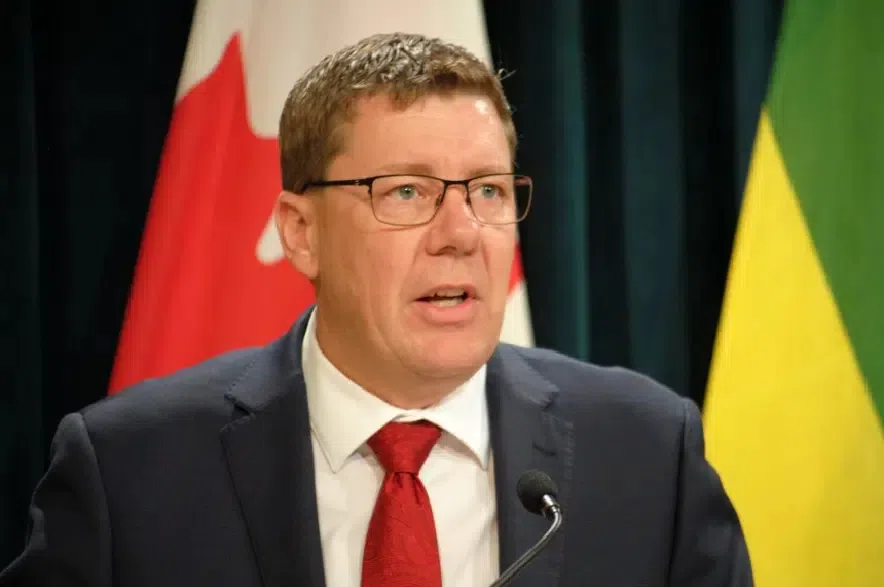Saskatchewan Premier Scott Moe was cautiously optimistic on Monday after U.S. President Donald Trump agreed not to impose tariffs on Canada and Mexico for another month, pulling back from a plan that would have tipped North America into a trade war on Tuesday.
“The delay of President Trump’s tariffs is welcome news today, however, we know there is more work to do,” Moe said in a statement Monday evening.
Read more:
- Moe calls for ‘de-escalation,’ but supports first round of counter-tariffs
- Some Sask. shoppers prioritizing Canadian products ahead of U.S. tariffs
- Trade war fallout: Prepare for grocery price hikes, business analyst says
“This is a temporary pause, and we need to continue leveraging our relationships as we work to find a more permanent solution.
Moe said the federal government should move quickly on their border security commitments to demonstrate real action.
“I will be reiterating the message that Saskatchewan’s exports are crucial to North American food and energy security in Washington next week.” he said.
The premier has previously moved to strengthen security at the Saskatchewan-United States border.
Moe said earlier on Monday he would like to see the Canada Border Services Agency folded into the Canadian military, which would allow for troop deployments along the border, and bring Canada closer to meeting its NATO-mandated defence spending commitments.
Prime Minister Justin Trudeau spoke with Trump twice on Monday, their first discussions since the president took over the White House on Jan. 20.
After what Trudeau described on social media as a “good call” in the afternoon, the two leaders agreed to pause tariffs for at least 30 days.
I just had a good call with President Trump. Canada is implementing our $1.3 billion border plan — reinforcing the border with new choppers, technology and personnel, enhanced coordination with our American partners, and increased resources to stop the flow of fentanyl. Nearly…
— Justin Trudeau (@JustinTrudeau) February 3, 2025
Trudeau released a statement on X that outlined the broad strokes of the $1.3-billion border plan his government had announced in December, adding that “nearly 10,000 front line personnel are and will be working to protect the border.”
That mirrors the number of troops Mexican President Claudia Sheinbaum pledged to send to the U.S. border on Monday morning when she announced that she had secured a deal with Trump to delay the tariffs on her country by one month.
‘Canada needs to get its act together on trade matters’
CKOM/CJME business analyst Paul Martin greeted the 30 day tariff extension with open arms.
“It’s a welcomed development, no question,” he said on Monday. “In an ideal world (tariffs) would be off the table completely.”
Martin said Trump used the tariffs as a bargaining chip to get Canada and Mexico to take bigger steps to keep fentanyl and illegal migrants from crossing the border.
However with the threat of tariffs still on the table, Martin thinks the U.S. president will continue to use things to his advantage.
“He (Trump) has certainly made us dance on the head of a pin for the last five days, so if he can do it for another month, I guess he thinks he’s won a score on his side of the ledger,” he said.
Martin said he expects the markets to settle and the value of the Canadian dollar should go up a little bit over the next month.
He added that the tariff threats may be a reason for the country to assess some barriers when it comes to trade.
“I don’t think that anybody is going to be sitting on their hands,” he said. “This was the warning shot across the bow that Canada needs to get its act together on trade matters.”
Within the next month, Martin said consumers could still be looking at ways to spend their dollars with Canadian suppliers.
Trump signed a pair of executive orders on Saturday that laid out a plan to impose 25 per cent across-the-board tariffs on Mexico and 25 per cent tariffs on most Canadian goods, with a lower 10 per cent tariff on Canadian energy.
The executive orders say the levies are a response to illegal immigration and drug smuggling, and use the International Emergency Economic Powers Act to declare an economic emergency that allows Trump to bypass Congress.
The order related to Canada says Mexican cartels are operating in the country and claims the modest amount of fentanyl intercepted at the northern border would be enough to kill “9.5 million Americans.”
On Saturday, Canada delivered a strong response to the tariffs that were due to begin Tuesday, with Trudeau announcing Canada’s response would be the placement of 25-per-cent tariffs against $155 billion of American goods.
“This will include immediate tariffs on $30 billion worth of goods as of Tuesday, followed by further tariffs on $125 billion worth of American products in 21 days’ time to allow Canadian companies and supply chains to find alternatives,” he said.
Drug cartels to be designated as terrorists
Trudeau said Monday that Canada will list cartels as terrorist entities.
“I have also signed a new intelligence directive on organized crime and fentanyl and we will be backing it with $200 million,” he said on X.
Canada plans to launch a joint strike force with the U.S. to combat organized crime, fentanyl trafficking and money laundering, and will appoint a “fentanyl czar” — though Trudeau gave no indication of what that job would entail.
The prime minister did not take questions from reporters on Monday.
Trump declared victory in a post on Truth Social, saying Canada agreed to “finally end the deadly scourge of drugs like Fentanyl that have been pouring into our Country, killing hundreds of thousands of Americans.”
But his message ends with a warning that tariffs are not off the table.
“I am very pleased with this initial outcome, and the Tariffs announced on Saturday will be paused for a 30 day period to see whether or not a final Economic deal with Canada can be structured,” Trump wrote, finishing with “FAIRNESS FOR ALL.”
The 30-day pause does mean that Canada’s counter-tariffs are also on hold. Several provinces were scrambling late in the day to reverse plans to implement non-tariff measures, such as barring the sale of American liquor and removing all U.S. alcohol.
The late-day news of a pause came after markets closed after a difficult Monday. Canada’s main stock index, the S&P/TSX composite, was down nearly 300 points at the closing bell, while the loonie fell to its lowest level in more than two decades.
It also came after another day of shifting rhetoric from the White House.
Trump’s stated rationale for the tariffs — the need to end the flow of drugs and migrants into the U.S. — is tied to the emergency order he signed, but he has also said he wants to end the U.S. trade deficit with Canada.
Between calls with Trudeau on Monday, Trump lamented to reporters in the Oval Office that Canada has been “very tough to deal with” and “very unfair.”
When asked whether there was anything Trudeau could offer him to get him to back off the threat, Trump went back to another now-familiar line.
“What I’d like to see? Canada become our 51st state,” he said, adding “we don’t need them for anything.”
Canada also plans to launch a joint strike force with the U.S. to combat organized crime, fentanyl and money laundering.
Trudeau says the pause will last at least a month “while we work together.”
— with files from 980 CJME’s Gillian Massie and CJME News
Read more:
- Moe calls for ‘de-escalation,’ but supports first round of counter-tariffs
- Some Sask. shoppers prioritizing Canadian products ahead of U.S. tariffs
- Trade war fallout: Prepare for grocery price hikes, business analyst says







